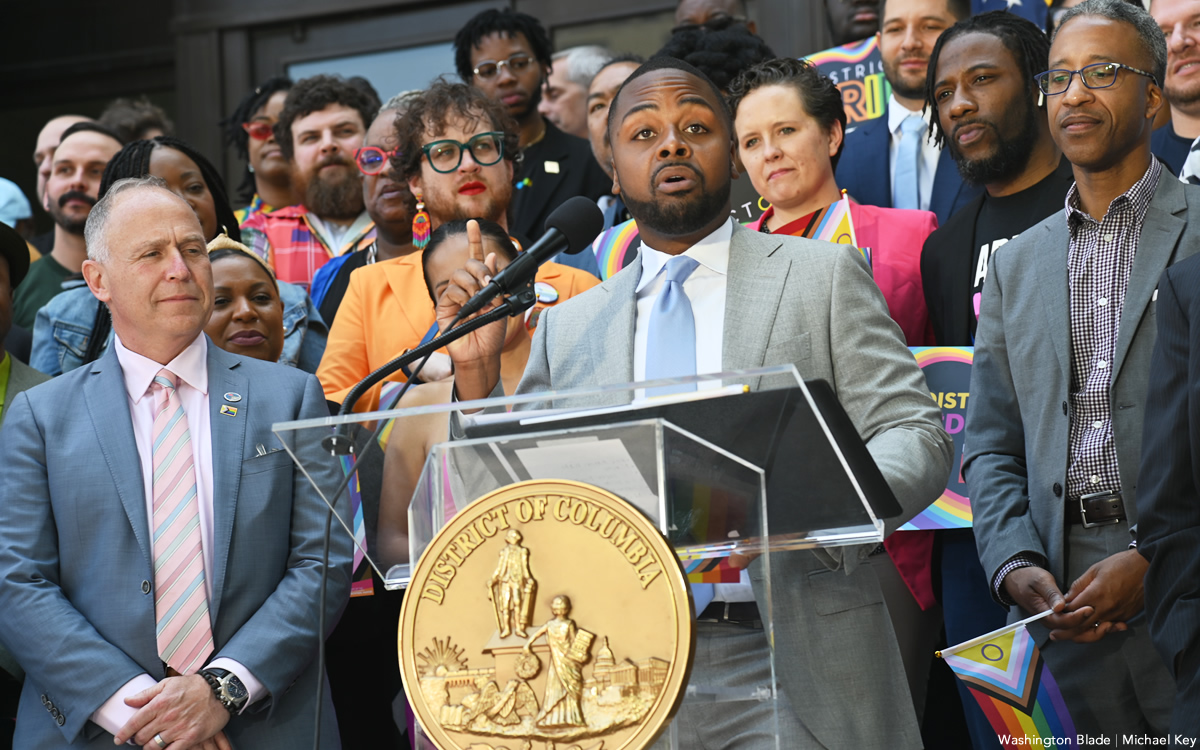Local
‘Reel’ debt delays festival
Acclaimed LGBT film event moved to April due to money woes

Larry Guillemette of One In Ten, the non-profit group that organizes Reel Affirmations, said fundraising challenges forced the event to be rescheduled to April 2011. (Washington Blade photo by Michael Key)
An inability to raise the money needed to hold D.C.’s annual LGBT film festival this October has spurred a decision to reschedule Reel Affirmations for spring 2011, according to organizers and sources familiar with the event.
The money problems also prompted organizers to reassess the time of year the event should be held, leading to a permanent rescheduling of the highly acclaimed event for late April and early May in succeeding years.
Larry Guillemette, marketing and sponsorship manager for One In Ten, the non-profit group that has organized Reel Affirmations each October for the past 19 years, acknowledged that a debt exceeding $40,000 from last year’s festival and a diminishing number of corporate sponsors and donors made it difficult to pull together the festival this year.
It had been scheduled to take place Oct. 14-23 in a number of prominent city theaters, including the Harmon Center for the Arts, the Goethe Institute and the E Street Cinema downtown, the Jewish Community Center near Dupont Circle and the AFI Theater in Silver Spring.
“As with a lot of non-profit organizations in our nation’s capital, gay or straight, we are faced with the same [monetary] challenges,” Guillemette said.
“What we found ourselves doing this year was going to various different organizations that we were hoping might sponsor us. And the economy being what it is, that kind of ability to support us wasn’t there,” he said.
Guillemete said One In Ten will screen three LGBT films this fall, including an award-winning film the group planned to announce soon. Beginning in November, One In Ten will resume a practice it previously discontinued: a monthly showing of an LGBT film in Washington at different theaters.
The group’s ability to hold the full festival in October was further hampered by last year’s resignation of Margaret Murray, who had served as One In Ten’s executive director since 2006, Guillemette said. He noted that it was Murray’s job to work on corporate and organizational sponsorships and other fundraising efforts for the 2010 festival beginning in the latter months of 2009.
“What that did for us on some levels is put us in a tiny bit of a period of flux and transition that we weren’t necessarily prepared for because that was the time of year that most festivals are putting together their proposals for funding for the following year,” he said.
Meanwhile, the group’s debt and general shortage of funds prevented the hiring of someone to replace Murray, who left to take a new job, he said.
At the time of Murray’s departure in November, Guillemette said, One In Ten had become nearly an all-volunteer organization, returning to its “roots” before its first executive director was hired in 2000.
Joe Bilancio, One In Ten’s programs manager and the person in charge of obtaining the films, is being compensated as a consultant, Guillemette said. Guillemette is serving as a volunteer and called his work on the festival “a labor of love.”
According to Guillemette, the funding problems were just one of several issues that prompted the One In Ten board to move the annual festival to the spring. He said other factors included competing LGBT events in October, such as the Human Rights Campaign’s annual national dinner and the Miss Adams Morgan drag pageant, a large event that attracts participants who might otherwise attend the film festival.
Guillemette said the problems associated with holding the festival this October led to long discussions on something the event’s organizers have contemplated for a number of years: the advantages of holding a film festival in the early months of the year.
Among other things, top-quality LGBT-related films made by independent filmmakers are usually released in the early part of the year and shown at other film festivals in the winter and spring, said Guillemette and Bilancio. The two noted that by the time One In Ten’s Reel Affirmations festival is held in the fall, some of the patrons of Reel Affirmations have already seen these films at other festivals.
In recent years, a number of films shown at Reel Affirmations and other LGBT film festivals also have been shown first on gay cable television networks, with others sometimes available through Netflix, said Guillemette and Bilancio.
“It’s significantly different than what it was when we started the festival in the early 1990s, when access to independent gay film was not that easy,” Guillemette said. “And we could count on a sold-out festival because there weren’t options like Neflix and Logo and Here TV and other things.”
Although moving the festival to the spring won’t counter the competing venues for gay film, Bilancio said holding Reel Affirmation in the early part of the year will at least ensure that it’s the first opportunity for most D.C. festival goers to see the films.
One source familiar with last year’s Reel Affirmations festival, who spoke with the Blade on condition of anonymity, said the One In Ten debt stemmed from a drop in revenue compared to previous festivals. Ticket sales were down as was advertising in the festival’s lengthy program booklet, the source said.
Instead of generating seed money for the 2010 festival, which was slated to celebrate Reel Affirmations’ 20th anniversary, the revenue shortfall resulted in debts to various vendors, including the graphic artist who helped produce the program booklet. At least $20,000 to $25,000 was needed to produce the booklet for this year, a sum the group apparently did not have, the source said.
Organizers were hopeful that a special town hall meeting that One In Ten held in April at the Human Rights Campaign headquarters would persuade people to make the donations that were needed to keep the event on track for October. But less than $5,000 was raised as a result of the town meeting, the source said, an amount far less than was needed to stage the festival in October.
Guillemette, who was not among the festival organizers last year, said still other factors were at play, including foul weather during several evenings of the October 2009 festival. He also noted that an earlier decision to discontinue the festival’s VIP membership program, which provided special benefits to large donors, made the festival more reliant on single ticket sales, which were down in 2009.
He said the board this year reinstated the VIP membership program and is taking other steps to better promote the spring festival.
“We’re not burying our head in the sand. We fully acknowledge there were things that needed to be changed in the way we did things,” he said. “And I think we brought back the right team to make those changes.”
Lisa King, One In Ten’s board president, declined to comment, deferring to Guillemette as the organization’s spokesperson. Murray could not be immediately reached for comment.
Maryland
What Anne Arundel County school board candidates think about book bans
State lawmakers passed Freedom to Read Act in April

BY ROYALE BONDS | Parents’ efforts to restrict content available to students in school libraries has become a contentious issue in Maryland. Conservative parent groups, such as Moms for Liberty, have been working to get books they believe are inappropriate removed from libraries in Carroll and Howard counties, sparking protests, new policies, and even a state law.
The Freedom to Read Act, passed in April, sets standards that books cannot be removed from public and school libraries due to an author’s background. Library staff that uphold the standard are protected under this act. The law, however, does not prohibit removing books deemed “sexually explicit,” the stated reason local Moms for Liberty chapters challenged school library books.
The rest of this article can be read on the Baltimore Banner website.
District of Columbia
D.C. Council member proposes change for Mayor’s Office of LGBTQ Affairs
Parker also seeks increased funding for LGBTQ programs in FY 2025 budget

D.C. Council member Zachary Parker (D-Ward 5), the Council’s only LGBTQ member, has asked his fellow Council members to support a proposal to change the Mayor’s Office of LGBTQ Affairs to become a “stand-alone entity outside the Executive Office of the Mayor to allow for greater transparency and accountability that reflects its evolution over the years.”
In an April 30 letter to each of his 12 fellow Council members, Parker said he plans to introduce an amendment to the city’s Fiscal Year 2025 Budget Support Act to make this change for the LGBTQ Affairs Office.
His letter also calls for adding to the city’s FY 2025 budget two specific funding proposals that local LGBTQ activists submitted to D.C. Mayor Muriel Bowser that the mayor did not include in her budget proposal submitted to the Council. One calls for $1.5 million to fund the completion of the build out and renovation for the D.C. Center for the LGBTQ Community’s new building in the city’s Shaw neighborhood and $300,000 in subsequent years to support the LGBTQ Center’s operations.
Parker’s second budget proposal calls for what he said was about $450,000 to fund 20 additional dedicated LGBTQ housing vouchers as part of the city’s existing program to provide emergency housing support for LGBTQ residents and other residents facing homelessness.
“The Office of LGBTQ+ Affairs currently manages about 90 vouchers across various programs and needs,” Parker said in his letter to fellow Council members. “Adding an additional 20 vouchers will cost roughly $450,000,” he wrote, adding that dedicated vouchers “play a crucial role in ensuring LGBTQ+ residents of the District can navigate the complex process of securing housing placements.”
In her proposed FY ’25 budget, Bowser calls for a 7.6 percent increase in funding for the Office of LGBTQ Affairs, which amounts to an increase of $132,000, bringing the office’s total funding to $1.7 million.
“To be clear, I support the strong work and current leadership of the Office of LGBTQ+ Affairs,” Parker says in his letter to fellow Council members. “This push for change is in recognition of the office’s notable achievements and the significant demands being placed on it, which require a greater level of accountability.”
Parker told the Blade in an April 30 telephone interview that he believes Japer Bowles, the current director of the Office of L|GBTQ Affairs is doing an excellent job in operating the office, but he believes the office would be able to do more for the LGBTQ community under the change he is proposing.
“Making it a stand-alone office versus it being clustered within the Community Affairs division of the mayor’s office, it will get more attention,” Parker told the Blade. “The leadership will have greater flexibility to advocate for the interest of LGBTQ residents, And we will be able to conduct greater oversight of the office,” he said, referring to the Council’s oversight process.
Parker noted that other community constituent offices in the mayor’s office, including the Office of Latino Affairs and the Office of Veterans Affairs are stand-alone offices that he hopes to bring about for the LGBTQ Affairs Office. He said Council member Brianne Nadeau, who chairs the Council committee that has oversight for the LGBTQ Affairs Office, has expressed support for his proposal.
Also expressing support for Parker’s proposal to make the LGBTQ Affairs Office a stand-alone office is the D.C. Advisory Neighborhood Commission Rainbow Caucus. Vincent Slatt, the caucus’s chairperson, submitted testimony last week before the D.C. Council Committee on Public Works and Operations, which is chaired by Nadeau, calling for making the LGBTQ Affairs Office a stand-alone office outside the Executive Office of the Mayor.
Slatt also stated in his testimony that the office has a “chronic staffing shortage” and recommended that at least three additional staff members be assigned to the office.
Daniel Gleick, the mayor’s press secretary, told the Blade the mayor’s office is reviewing Parker’s budget proposals, including the proposed change for the Office of LGBTQ Affairs.
But in testimony at a May 1, D.C. Council budget hearing before the Council’s Committee on Executive Administration and Labor, Lindsey Parker, Mayor Bowser’s Chief of Staff, appeared to express skepticism over making the LGBTQ Affairs office a stand-alone office. Lindsey Parker expressed her thoughts on the proposed change when asked about it by Councilmember Anita Bonds (D-At-Large), who chairs the committee that held the hearing.
“I would proffer that it doesn’t matter whether the agency is within the EOM [Executive Office of the Mayor] or not,” Lindsey Parker told Bonds. “They will still be reporting up into one would argue the most important agency in the D.C. government, which is the one that supports the mayor,” Lindsey Parker said. “So, it’s the closest to the mayor that you can get,” she said “So, you could pull it out and have a different budget chapter. I actually think that’s confusing and convoluted.”
Lindsey Parker added, “The Mayor’s Office of LGBTQ Affairs, with their six FTEs right now, if they were a stand-alone function they wouldn’t have all the non-personnel services in order to operate. They need to be under sort of the shop of the EOM in order to get those resources.”
By FETs Lindsey Parker was referring to the term Full Time Equivalent employees.
Rehoboth Beach
Former CAMP Rehoboth official sentenced to nine months in prison
Salvator Seeley pleaded guilty to felony theft charge for embezzlement

Salvator “Sal” Seeley, who served as an official with the Rehoboth Beach, Del., CAMP Rehoboth LGBTQ community center for 20 years, was sentenced on April 5 by a Sussex County Superior Court judge to nine months in prison and to pay $176,000 in restitution to the organization.
The sentencing took place about five weeks after Seeley pleaded guilty to a charge of Theft in Excess of $50,000 for allegedly embezzling funds from CAMP Rehoboth, a spokesperson for the Delaware Department of Justice told the Washington Blade.
Seeley’s guilty plea came shortly after a grand jury, at the request of prosecutors, indicted him on the felony theft charge following an investigation that found he had embezzled at least $176,000 from the nonprofit LGBTQ organization.
“Salvatore C. Seeley, between the 27th day of February 2019 and the 7th day of September 2021, in the County of Sussex, State of Delaware, did take property belonging to CAMP Rehoboth, Inc., consisting of United States currency and other miscellaneous property valued at more than $50,000, intending to appropriate the same,” the indictment states.
“The State recommended a sentence of two years of incarceration based on the large-scale theft and the impact to the non-profit organization,” Delaware Department of Justice spokesperson Caroline Harrison told the Blade in a statement.
“The defense cited Seeley’s lack of a record and gambling addiction in arguing for a probationary sentence,” the statement says. “Seeley was sentenced in Superior Court to a nine-month prison term and to pay a total of $176,000 in restitution for the stolen funds,” Harrison says in the statement.
Neither Seeley nor his attorney could immediately be reached for comment.
At the time of Seeley’s indictment in February, CAMP Rehoboth released a statement saying it first discovered “financial irregularities” within the organization on Sept. 7, 2021, “and took immediate action and notified state authorities.” The statement says this resulted in the investigation of Seeley by the state Department of Justice as well as an internal investigation by CAMP Rehoboth to review its “financial control policies” that led to an updating of those policies.
“As we have communicated from day one, CAMP Rehoboth has fully cooperated with law enforcement,” the statement continues. “At its request, we did not speak publicly about the investigation while it was ongoing for fear it would jeopardize its integrity,” according to the statement. “This was extremely difficult given our commitment to transparency with the community about day-to-day operations during the recent leadership transition.”
The statement was referring to Kim Leisey, who began her job as CAMP Rehoboth’s new executive director in July of 2023, while the Seeley investigation had yet to be completed, following the organization’s process of searching for a new director. It says Seeley left his job as Health and Wellness Director of CAMP Rehoboth in September of 2021 after working for the organization for more than 20 years.
“Mr. Seeley’s actions are a deep betrayal to not only CAMP Rehoboth but also the entire community we serve,” the statement says.




















